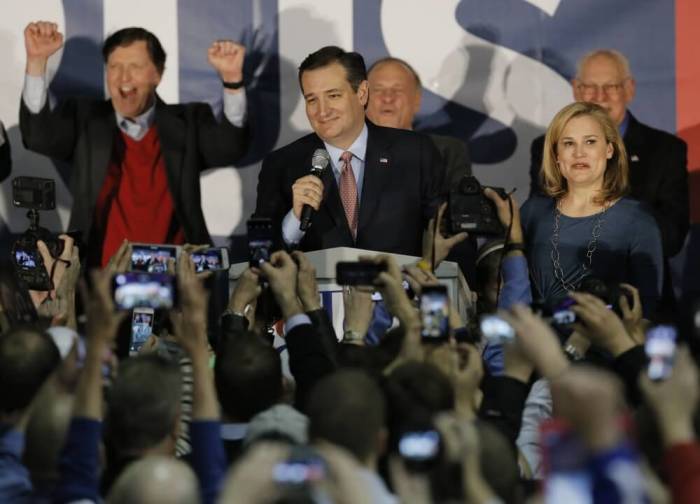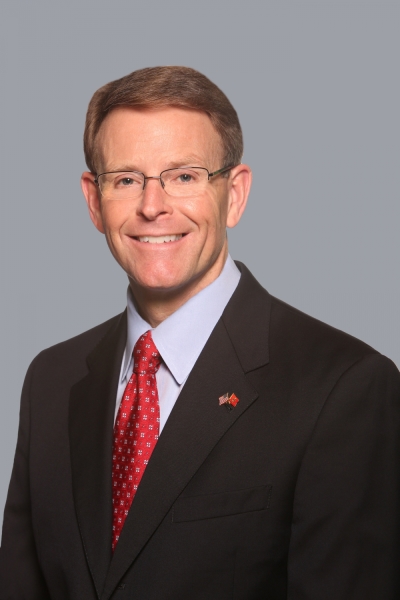Ted Cruz Is 'Awakening' 'Dormant Evangelicals' to Vote for Him, FRC Pres. Tony Perkins Says

The high evangelical turnout in the Iowa caucuses Monday is proof that Republican presidential candidate Ted Cruz is 'awakening' and 'energizing' Christian conservative voters who did not turn out in the 2012 election, leading conservative activist Tony Perkins said Wednesday.
As 64 percent of Iowa's Republican caucus goers were evangelicals, the staunch conservative Texas senator won the caucus with just over 27 percent of the vote and three-plus-percentage-point victory over GOP frontrunner Donald Trump.

Perkins, who endorsed Cruz last week and was later announced the chair of the Pro-Lifers for Cruz coalition, told The Christian Post that the results in Iowa are an indicator that Cruz has what it takes to "go the distance," thanks to the support that he will receive from evangelical voters who stayed away from the polls in 2008 and 2012 because they weren't inspired enough by the GOP nominees to go place their votes.
"The interesting thing here about Ted Cruz, and I think we saw this in Iowa, is what I call 'the Ted effect,'" Perkins, the president of the Family Research Council, said. "That is that there have been a large number of evangelicals — we know this from the 2012 numbers, that about 26 million evangelicals did not vote. Those are dormant evangelicals that Ted Cruz, I believe, is awakening, and that is what we saw in Iowa with a record turnout. Those guys that have been sitting on the sidelines, finally see somebody that they are energized and enthused enough that they can come in and support."
Although a claim made by Cruz last year that about half of born-again Christians are not voting has been debated, there was still a seven percentage point increase in the number of evangelical voters who participated in the 2016 Iowa caucuses than participated in the 2012 Iowa caucuses.
Although pundits thought before the caucus that a higher turnout would improve Trump's chances of winning, that was not the case. Thirty-four percent of the evangelical Republican caucus goers voted for Cruz, while 22 percent voted for Trump and 21 percent voted for Florida Sen. Marco Rubio.
"Predictions were that with new voters that there was going to be a turnout of over 140,000 and that was going to bode well for Trump," Perkins explained. "But what we found out is that was not the case. With 180,000 people turning out, which shattered all the records, the majority did not break for Trump, they broke for Cruz."
"I believe it is those evangelicals that have not been motivated and have not found someone that they can enthusiastically support, they have found it in Ted and they have showed up to support him," Perkins continued.
Although the winners of the last two Republican Iowa caucuses — former Arkansas Gov. Mike Huckabee and former Pennsylvania Sen Rick Santorum — did not end up winning the Republican nominations in 2008 and 2012, Perkins believes that Cruz is in an "unprecedented" position as a conservative to actually maintain momentum and win the Republican nomination.
"The majority of the evangelical vote is with Ted. Here is where I think people are going to start looking is that he is best prepared and positioned to go the distance. This is the first time a conservative has come out of Iowa, not just with a prayer but with preparation," Perkins added. "He comes out of Iowa with the largest amount of money on hand and nation-wide infrastructure that is carrying him all the way to the [Republican National] Convention in Cleveland. That is, as far as I can recall, unprecedented."
One of the question marks surrounding Cruz is his electability in the general election. Should he make it to the general election will he be able to beat out the Democratic nominee and win over more moderate voters?
Perkins admits that a nominee cannot win the general election with just the support of evangelicals. However, he asserts that it was the lack of mobilizing the evangelical vote, which Perkins says makes about one-third of the general election electorate, that was the downfall for John McCain and Mitt Romney.
"So, you can't win just with the evangelical vote but you can't win without it," Perkins said.
During his victory speech Monday night, Cruz suggested that he will be able to bring out the "Reagan Democrats."
"What scares [the Washington cartel] is that the old Reagan coalition is coming back together of conservatives," Cruz said. "We're seeing conservatives and evangelicals and libertarians and Reagan Democrats all coming together as one and that terrifies Washington D.C."
Eric Teetsel, the Rubio campaign's director of faith outreach, told CP in a statement Thursday that the narrative that evangelicals are a "homogenous" voting bloc is false. He argued that evangelicals wouldn't "compromise" their Christian values by voting for Rubio, as there are "few-if any-substantive policy differences" between Cruz and Rubio when it comes to the issues that evangelicals care most about — life, marriage, religious liberty, judicial activism, parental rights, and educational choice.
As Perkins told CP that the support that Rubio saw in the caucus came from "self-described moderates" and that Rubio has positioned himself to be "acceptable to the establishment," Rubio has received great scores from some of the nations's leading conservative activist organizations, including a 100 percent score from the political arm of the Family Research Council.
Along with a 94 rating from Heritage Action, Teetsel argued that Rubio is more likely to appeal to "citizens from across the political spectrum."
"Cruz argues he can win by appealing exclusively to hardcore conservatives. That's a myth that has been thoroughly refuted. Even if there's a chance it's true, why gamble?" Teetsel said in a statement. "Ted Cruz is all about dividing people; Marco is about uniting all sorts of different people who share in common the hope that America will reclaim its place as the one place that makes it possible for anyone to flourish."
Although Perkins' public endorsement of Cruz didn't occur until last week, Perkins has been a vital part of an effort to coalesce national evangelical and social conservative leaders to endorse Cruz.
Perkins spearheaded a December gathering in Virginia of as many as 50 prominent evangelical and social conservative leaders, where the leaders voted on which presidential candidate they should unite around. With some of the leaders pushing for Cruz and others pulling for Rubio, it reportedly took five different votes until the group could reach a required 75 percent majority for them to unite around Cruz. Since the meeting, a number of the reported participants in the meeting have endorsed Cruz, including Iowa social conservative leader Bob Vander Plaats and Focus on the Family's James Dobson.
With Iowa evangelical voters having many viable candidates to choose from — Cruz, Huckabee, Santorum, Rubio, retired neurosurgeon Ben Carson, former Hewlett Packard CEO Carly Fiorina — Perkins believes the uniting of key evangelical and conservative leaders behind Cruz has had a big impact. Even before the Virginia gathering and his endorsement, Perkins participated in a Cruz rally for religious liberty in South Carolina in November.
"It's historic in that we have had conservative leaders, not just evangelicals, but conservative leaders that have come together this early in the process to support a candidate and I think it showed," Perkins said. "I think it showed in the numbers. The turnout was huge and the conservative votes, not just evangelical vote but those that are most conservative, broke for Ted Cruz as well. I think [the endorsements] clearly had an impact on a crowded field as it is."
Despite many Christian leaders endorsing Cruz, many other prominent Christians are backing Rubio, including Joni Eareackson-Tada, Wayne Grudem and Santorum, who dropped out of the election this week. Additionally, Liberty University President Jerry Falwell Jr. has endorsed Trump.




























